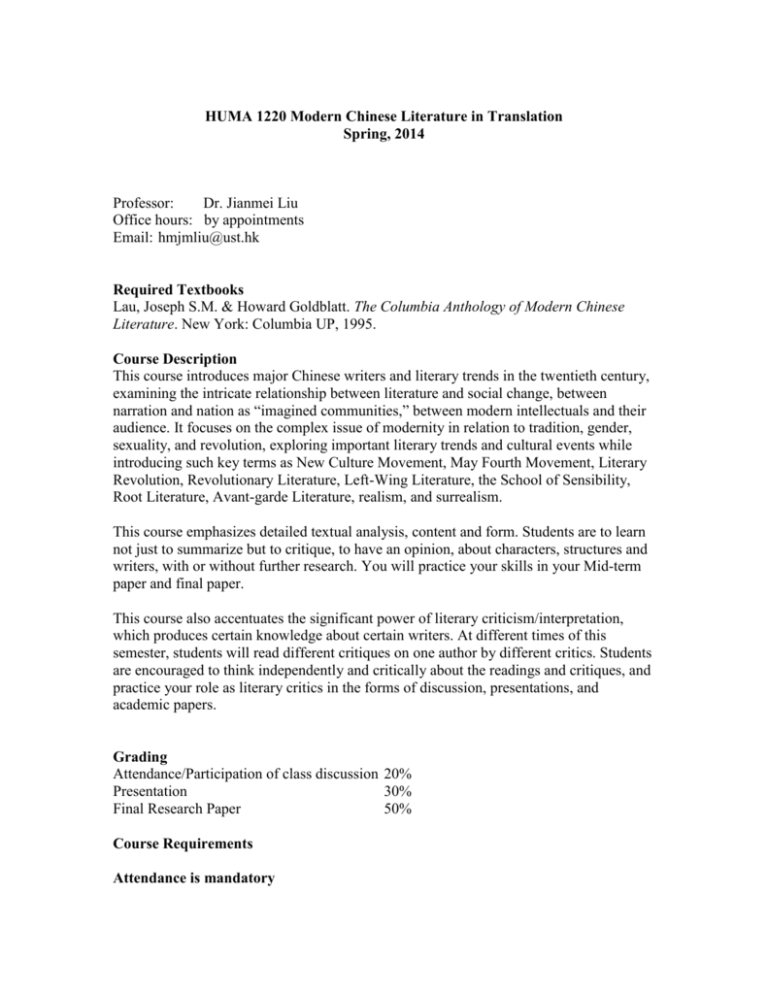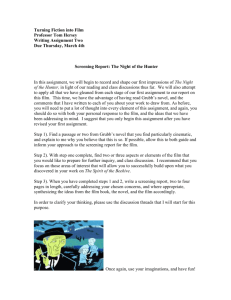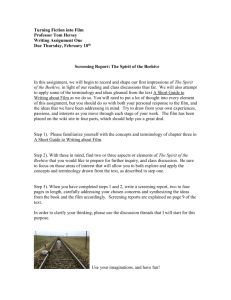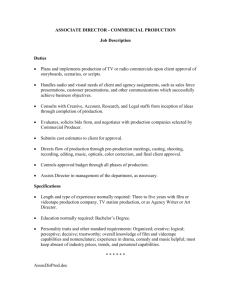HUMA 1220 Modern Chinese Literature in Translation Spring, 2014
advertisement

HUMA 1220 Modern Chinese Literature in Translation Spring, 2014 Professor: Dr. Jianmei Liu Office hours: by appointments Email: hmjmliu@ust.hk Required Textbooks Lau, Joseph S.M. & Howard Goldblatt. The Columbia Anthology of Modern Chinese Literature. New York: Columbia UP, 1995. Course Description This course introduces major Chinese writers and literary trends in the twentieth century, examining the intricate relationship between literature and social change, between narration and nation as “imagined communities,” between modern intellectuals and their audience. It focuses on the complex issue of modernity in relation to tradition, gender, sexuality, and revolution, exploring important literary trends and cultural events while introducing such key terms as New Culture Movement, May Fourth Movement, Literary Revolution, Revolutionary Literature, Left-Wing Literature, the School of Sensibility, Root Literature, Avant-garde Literature, realism, and surrealism. This course emphasizes detailed textual analysis, content and form. Students are to learn not just to summarize but to critique, to have an opinion, about characters, structures and writers, with or without further research. You will practice your skills in your Mid-term paper and final paper. This course also accentuates the significant power of literary criticism/interpretation, which produces certain knowledge about certain writers. At different times of this semester, students will read different critiques on one author by different critics. Students are encouraged to think independently and critically about the readings and critiques, and practice your role as literary critics in the forms of discussion, presentations, and academic papers. Grading Attendance/Participation of class discussion 20% Presentation 30% Final Research Paper 50% Course Requirements Attendance is mandatory Attendance is mandatory. Class participation is expected since talking with fellow students is the best way to learn. So earn your good grade the fun way—start and keep talking in class! Don’t be afraid to make mistakes, but you do need to show that you are familiar with the readings and that you have seriously thought about the texts. Be prepared and read before class. Presentations (one individual presentation) Sign-up is on the first day of class. Your presentations can be based on the questions given to you, or can be the result of your own independent research. You can select one or more reading, focus on one character, or compare/contrast different characters. This means that you need to make a clear argument/present a reasonable opinion, supported by details from the text and/or your research. On the other hand, it is not a formal paper. So you can use lists, bullets, tables, etc. to organize your arguments. Your oral presentation will be about 10 minutes. You are encouraged to do powerpoint presentation. You CANNOT just summarize the text(s), except when you are presenting the criticisms. But you are encouraged to ask thoughtful questions. Final Research Paper (10-15 pages, double-spaced): As for these two important papers, you can choose one paper to do a creative writing, such as fiction, essay, or play, but its subject must be related to modern or contemporary China. In other words, you need to contextualize your story in modern China, because that is also the way to test your understanding of modern Chinese history. You can even direct and shoot a film if you like. But if you choose to do a creative writing, the other paper has to be a formal academic paper. Of course, you are welcome to do formal academic papers for both midterm and final. In your academic paper, you must present your thesis statement (your main argument), supported by well-organized evidences from the text(s) or your research. We will talk more about the structure of the formal paper later. Research papers come naturally for a literature class. You can certainly elaborate your presentations, or you may find something more interesting as a result of discussions or research. The academic paper is a critical analysis of the text(s), characters, themes, narration, etc. Remember critical analysis is NOT: 1. A summary. 2. Broad generalizations without further support and analysis 3. Citing long quotes from the readings without analyzing them or explaining their importance to you or to us Late paper: NOT accepted. Policies: 1. Students with disabilities should contact the instructor at the beginning of the semester to discuss any accommodation for this course. 2. This class prohibits students from cheating on exams, plagiarizing papers, submitting the same paper for credit in two courses without authorization, buying papers, submitting fraudulent documents, and forging signatures. Plagiarism policy: all quotations taken from other authors, including from the Internet, must be indicated by quotation marks and referenced. Paraphrasing must be referenced as well. 3. Religious observance: Please inform your instructor of any intended absences for religious observance in advance. 4. This syllabus may be subject to change. Students will be notified in advance of important changes that could affect grading, assignments, etc. 5. Unless otherwise directed, students are expected to remain in the classroom for 15 minutes in the unlikely event that the instructor should not arrive on time. After 15 minutes, it may be assumed that class will not be held. Course Schedule Subjected to change. It is YOUR responsibility to adjust to it. Week One Introduction to the course; Sign up for Presentations Film screening: China in Revolution Week Two The May-Fourth movement Lu Xun, “Preface to Call to Arms,” 3-7; “A Madman’s Diary,” 8-16 Lee, “Literary Trends I,” 172-180 (R) Lu Xun, “Medicine,” Lu Xun, “A Warning to the People,” Lu Xun, “Kong Yiji,”17-21 Lu Xun, “Upstairs in a Wineshop,” Lu Xun, “New Year’s Sacrifice,” Week Three Lu Xun, “Story of Ah Q” Yu Dafu, “Sinking,” 31-55 Shen Congwen, “Xiaoxiao,” 82-94 Week Four Mao Dun, “Spring Silkworms,” 56-73 Shi Zhecun, “One Evening in the Rain Season,” 116-124 Week Five Introducing Zhang Ailing Film screening: The Eighteen Spring Discussion Week Six Film screening: Lust/ Caution Class Discussion Zhang Ailing, “Sealed Off,” 174-183 Week Seven Ding Ling, “When I Was in Xia Village,” 132-146 Film Screening: Lust, Caution Week Eight Film screening: Xiao Hong Xiao Hong, “Hands,” 161-173 Supplementary readings of Xiao Hong Week Nine Taiwan Literature and Film Bai Xianyong, “Winter Nights,” 210-223 Chen Yingzhen, “My Kid Brother Kangxiong,” 204-209 Li Ang, “Curvaceous Dolls,” 262-276 Xi Xi, “A Woman Like Me,” 303-313 Yuan Qiongqiong, “Tales of Taipei,” 314-320 Zhu Tianwen, “Fin De Siecle Splendor,” 388-402 Week Ten The Representation of Cultural Revolution Ba Jin: “Remembering Xiao Shan,” 685-696 Wen Jieruo: “Living Hell,” 697-703 Film clips of In the Heat of the Sun, Farewell My Concubine Film screening: The Mao Years Week Eleven Film Screening: To Live Yu Hua’s novels Week Twelve Film Screening: Red Sorghum Mo Yan’s Novels Mo Yan, “Iron Child,” 379-387 Week Thirteen Yu Hua, “On the Road at Eighteen,” 439-444 Can Xue, “Hut on the Mountain,” 325-328 Week Fourteen Film Screening: Peacock Week Fifteen Liu Heng, “Dogshit Food,” 366-378 Su Tong, “Escape,” 445-454 Chinese Poetry Xu Zhimo Li Jinfa Dai Wangshu Feng Zhi Bei Dao Shu Ting Yang Lian Gu Cheng Final Paper Due.








